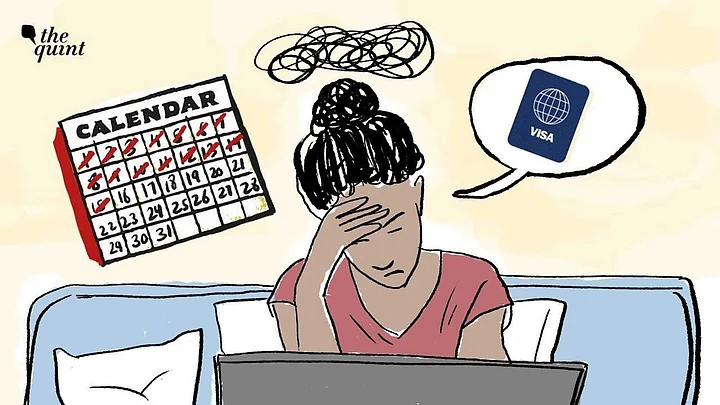In the backdrop of mounting visa delays and distressed students dotting the news, the US Embassy and Consulates in India announced last week that it could not accommodate all travellers prior to their planned travel dates, even if the purpose of travel was time-sensitive such as starting a new academic year.
"In India, I mean, there are families who are not able to meet their relatives there and people who can't keep their business appointments. There are students who are waiting for a long time. So, it's a genuinely problem of some magnitude," External Affairs Minister S Jaishankar said earlier this week, a day after his meeting with US Secretary of State Antony Blinken.
Amid all the confusion, The Quint spoke with a couple of study abroad counsellors to discern the course of action available to a student in such a scenario.
The professionals conveyed that despite the mayhem, students have no reason to panic.
If you are waiting to hear back on a student visa application, these are the things you need to know.
What should a student do if they don't get their visa on time?
In a conversation with The Quint, Vineet Gupta, managing director of Jamboree Education, revealed that the number of students experiencing such delays is significant.
The best you can do in such a situation is to apprise your university of these developments and make pre-emptive preparations for a deferral.
"For students whose terms are starting soon or who are worried that there might be delays, we advise them to stay in touch with their respective universities and keep them informed of the delays and explore all options. In case of deferrals, it is always advisable to check all deferral requirements right away and keep the university informed well ahead of time. The time to decide whether to take a deferral or not might come later, but the preparations for it need to be made in advance," Gupta said.
Meanwhile, speaking to The Quint, Nishit Kumar, head of content at Collegedunia, indicated that after COVID-19, most colleges are equipped to deal with technical delays and cooperate with the students.
He added, "We usually advise them to defer a session; however, some colleges also offer online learning for up to three months. This has been the case ever since the beginning of the pandemic."
Jamboree's Gupta, too, reiterated the preparedness of schools abroad and asserted that almost all universities have been supportive.
Gupta underlined, "One reason is that they understand that the delay is originating from factors that lie beyond the student's control. Second, once they have offered an admission to a student, they are very keen to have them on board."
What is the average number of days for the processing of a student US visa application in Delhi?
As per the US Department of State, the average wait time for an in-person interview for a student visa is 430 days (around 61 weeks).
What about the delays in other US consulates in India – Kolkata, Chennai, Hyderabad, and Mumbai?
There are huge delays in other cities as well. The precise wait times for interviews in US consulates located in other cities are as following:
Kolkata: 444 days (63 weeks)
Mumbai: 430 days (61 weeks)
Hyderabad: 430 days (61 weeks)
Chennai: 29 days (4 weeks)
Are these times likely to change? How can students check the updated waiting periods?
The waiting times can be reviewed using the drop-down option on the US embassy's website. You can find the tool if you follow this link: https://travel.state.gov/content/travel/en/us-visas/visa-information-resources/wait-times.html
But why are these delays happening?
Most recently, in a media interaction, US Secretary of State Antony Blinken blamed the COVID-19 pandemic for the backlog of visas.
“If it’s any consolation, I can tell you that this is a challenge that we’re facing around the world and it’s a product largely of the COVID pandemic. Our ability to issue visas dropped dramatically during COVID,” Secretary Blinken said, stressing the issue of self-financing of visas.
He added, “When COVID hit, the demand for visas fell through the floor, visa fees went away, the system, as a whole, suffered. And then of course, in actually issuing visas, even with much more limited resources, we had constraints from COVID about the number of people we could have in our embassies at any one time, etc."
Can we expect the US to take action in this regard soon? What are the Indian authorities saying?
Yes, the US has expressed that it is reviewing the situation; however, no explicit course of action has been announced yet.
In the press conference on Tuesday, the US official had underlined that the western country was addressing the issue of the backlog and that it would play out in the coming months.
“We are now building back very determinedly from that surging resource. We have a plan, when it comes to India, to address the backlog of visas that has built up. I think you’ll see that play out in the coming months...it’s something that we’re very focused on,” Blinken said.
Meanwhile, the Indian external affairs minister also stated, “There have been some challenges of late, and I flagged it to Secretary Blinken and his team, and I have every confidence that they will look at some of these problems seriously and positively."
What about the waiting period for a Canadian university?
There is some respite from student visa delays if you are planning to attend a Canadian university. Last week, Canada's High Commissioner to India Cameron MacKay, had stressed that the embassy is prioritising student applications.
At present, the average waiting period for a study permit to the country is 13 weeks.
And what about a UK university?
As per a UK government website, a student should receive their visa decision within three weeks.
However, in August, British High Commissioner to India Alex Ellis had announced priority and super priority visas (with additional costs) for Indian students facing delays.
